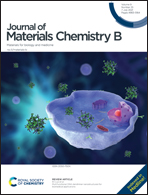Multifunctional DNA dendrimer nanostructures for biomedical applications
Abstract
DNA nanomaterials have attracted ever-increasing attention over the past decades due to their incomparable programmability and multifunctionality. In particular, DNA dendrimer nanostructures, as a major research focus, have been applied in the fields of biosensing, therapeutics, and protein engineering, benefiting from their highly branched configuration. With the aid of specific recognition probes and inherent signal amplification, DNA dendrimers can achieve ultrasensitive detection of nucleic acids, proteins, cells, and other substances, such as lipopolysaccharides (LPS), adenosine triphosphate (ATP), and exosomes. By virtue of their void-containing structures and biocompatibility, DNA dendrimers can deliver drugs or functional nucleic acids into target cells in chemotherapy, immunotherapy, and gene therapy. Furthermore, DNA dendrimers are being applied in protein engineering for efficient directed evolution of proteins. This review summarizes the main research progress of DNA dendrimers, concerning their assembly methods and biomedical applications as well as the emerging challenges and perspectives for future research.



 Please wait while we load your content...
Please wait while we load your content...